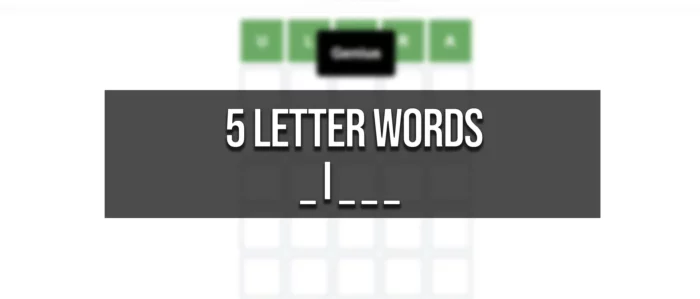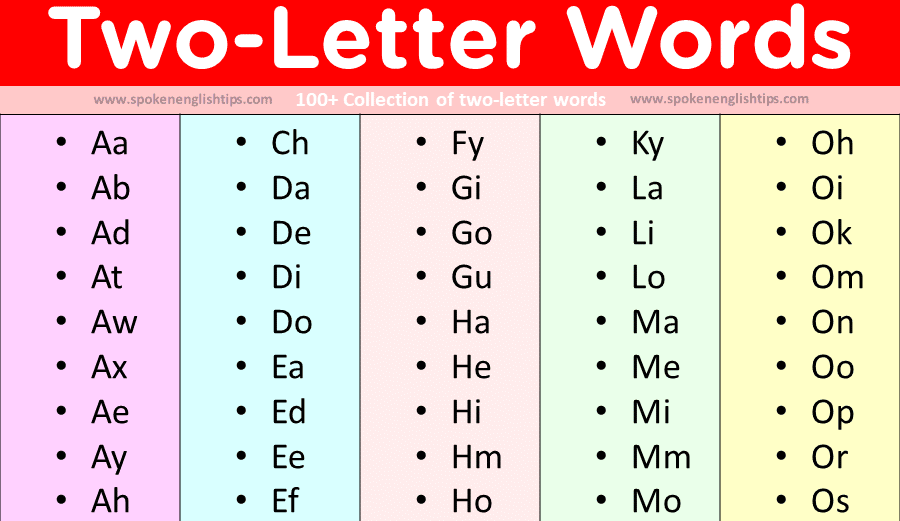Two letter phrases with i – Two-letter phrases with ‘i’ – a seemingly easy idea, however hiding a wealth of linguistic intricacies. From their formation and utilization to their frequency and contextual nuances, and even their fascinating origins, this exploration uncovers the hidden tales behind these compact but highly effective phrases. Put together to delve into the world of ‘it’, ‘in’, and extra, as we uncover the secrets and techniques they maintain.
This complete information examines the formation, frequency, and origins of two-letter phrases containing the letter ‘i’. We’ll categorize these phrases by a part of speech, analyze their contextual utilization, and discover their evolution over time. Anticipate detailed examples, insightful comparisons, and doubtlessly stunning discoveries about these seemingly insignificant phrases.
Two-Letter Phrases Containing ‘i’
Phrase Formation and Utilization
Phrase Formation and Utilization
A complete exploration of two-letter phrases incorporating the letter ‘i’ reveals an enchanting interaction between kind and performance. Understanding their grammatical roles sheds gentle on the economic system and effectivity of language. This evaluation delves into the intricacies of those compact phrases, highlighting their various purposes in sentence development.This exploration examines the particular formation and utilization of two-letter phrases containing the letter ‘i’.
We’ll categorize these phrases by their grammatical operate, offering clear examples for instance their utility. Understanding these seemingly easy phrases gives perception into the elemental constructing blocks of language.
Record of Two-Letter Phrases Containing ‘i’
This part presents a concise listing of all two-letter phrases containing the letter ‘i’. The simplicity of those phrases, whereas typically ignored, reveals a stunning vary of utilization throughout the English language.
- hello
- if
- in
- is
- it
Grammatical Operate of Every Phrase
Every two-letter phrase containing ‘i’ serves a definite grammatical position. This part elaborates on the operate of every phrase inside a sentence.
- hello: Used as a greeting or an off-the-cuff expression.
- if: A conjunction used to introduce a conditional clause.
- in: A preposition indicating location or time.
- is: A type of the verb ‘to be’, indicating existence or state.
- it: A pronoun used as the topic or object of a verb.
Categorization by A part of Speech
The next desk categorizes the two-letter phrases containing ‘i’ by their grammatical operate. This structured method permits for a transparent understanding of their roles in sentence development.
| Phrase | A part of Speech | Instance Sentence |
|---|---|---|
| hello | Interjection | “Hello there!” |
| if | Conjunction | “If it rains, we’ll keep inside.” |
| in | Preposition | “The ebook is within the field.” |
| is | Verb | “The cat is sleeping.” |
| it | Pronoun | “It’s a stunning day.” |
Frequency and Contextual Use of Two-Letter Phrases with ‘i’

Understanding the frequency and contextual use of two-letter phrases containing ‘i’ gives priceless insights into language patterns and utilization. This evaluation may be utilized throughout varied domains, from literature to information reporting, providing a nuanced understanding of how these phrases contribute to total that means and influence. The investigation into their prevalence and utility provides an enchanting glimpse into the dynamic nature of language.Analyzing the frequency and contextual use of two-letter phrases containing ‘if’ in various textual content varieties reveals attention-grabbing patterns.
This exploration examines the position of those phrases in numerous contexts, equivalent to novels, poems, and information articles, shedding gentle on their contribution to the general that means and influence.
Frequency of Incidence in Completely different Textual content Varieties
Understanding the frequency of two-letter phrases with ‘i’ throughout totally different textual content varieties (like novels, poems, information articles, and social media posts) reveals attention-grabbing patterns. Analyzing their utilization gives insights into how these phrases operate in particular contexts. The comparability of their frequency in these various classes highlights their significance in conveying that means and establishing tone.
- Novels: Two-letter phrases with ‘i’ typically seem in dialogue and descriptive passages, reflecting the pure circulate of dialog and the nuances of character portrayal.
- Poems: Their presence could be much less frequent however can contribute to rhythmic patterns, alliteration, or evoke particular feelings by means of their conciseness and sound.
- Information Articles: These phrases are usually much less prevalent in formal information writing, however would possibly seem in headlines, quotes, or temporary summaries, reflecting a extra concise and direct fashion.
- Social Media: The frequency of those phrases could be excessive because of their use briefly messages and hashtags, the place conciseness is prioritized.
Typical Meanings and Connotations
The that means and connotations of two-letter phrases with ‘i’ range relying on the particular phrase and the encompassing context. Understanding these refined nuances gives a richer comprehension of their contribution to total that means. Analyzing examples from various texts helps to establish the particular shades of that means.
- is: A standard verb, conveying existence or id, its use is pervasive throughout totally different textual content varieties, with minimal variation in connotation.
- in: A preposition signifying location or inclusion, its use is equally ubiquitous, various barely in context to recommend inclusion or location, with refined shifts in connotation.
- if: A conditional conjunction, suggesting chance or uncertainty, it provides complexity to the sentence and carries a big contextual weight, typically implying a conditional final result.
- it: A pronoun referring to a noun, it gives a concise strategy to keep away from repetition, and its frequency displays the significance of pronoun utilization in streamlining textual content.
Potential Analysis Areas
Additional analysis might discover the influence of utilizing two-letter phrases with ‘i’ on reader comprehension and engagement. This consists of learning the impact on readability and the way these phrases contribute to totally different textual content kinds. Investigating their influence on and search engine rating is one other space for exploration.
- Comparative evaluation: Evaluating the usage of two-letter phrases with ‘i’ in numerous languages can present insights into cross-cultural language patterns and utilization.
- Computational linguistics: Using computational strategies to investigate massive corpora of textual content might reveal patterns and developments of their utilization that aren’t readily obvious by means of guide evaluation.
- Impression on reader notion: Investigating how the frequency and context of those phrases have an effect on reader notion and comprehension is one other potential space for research.
Phrase Origins and Etymology of Two-Letter Phrases with ‘i’
Uncovering the historic roots of seemingly easy two-letter phrases reveals fascinating tales of linguistic evolution. Understanding how these phrases got here to be, and the way their meanings have modified over time, gives a deeper appreciation for the richness and complexity of language. This exploration delves into the etymological origins of phrases containing the letter ‘i’ and their transformations throughout time.This investigation examines the journey of two-letter phrases with ‘i’ from their earliest types to their present-day meanings.
Analyzing the etymology permits us to hint the event of language, and acquire a extra profound understanding of how phrases replicate cultural shifts and historic contexts. It gives perception into the interconnectedness of phrases, their relationships to different phrases, and the nuances of that means that come up over centuries.
Tracing the Roots of Two-Letter Phrases with ‘i’
This evaluation gives a structured look into the historic origins and evolution of two-letter phrases containing the letter ‘i’. Understanding the linguistic historical past of those concise phrases can reveal their significance in varied contexts, from on a regular basis communication to specialised fields.
Desk of Two-Letter Phrases with ‘i’ and their Origins, Two letter phrases with i
| Phrase | Origin | Present That means |
|---|---|---|
| in | Previous English – in | Inside, inside a spot or factor; expressing inclusion or involvement. |
| is | Previous English – is | Third-person singular current tense type of the verb “to be”; expressing existence or a state of being. |
| if | Previous English – gif | Used to precise a conditional assertion; introducing a hypothetical scenario. |
| it | Previous English – hit | Used to discuss with a factor or an individual; a impartial pronoun. |
| hello | Previous English – he | A proper type of handle; a pronoun used to indicate an individual of upper social standing. |
Closure: Two Letter Phrases With I

In conclusion, our journey by means of the world of two-letter phrases with ‘i’ has revealed a stunning complexity. From their basic grammatical roles to their wealthy historic context, these phrases showcase the fascinating interaction of language. This evaluation gives a framework for additional analysis and a deeper appreciation for the intricate nature of phrase formation and utilization.
Frequent Queries
What are some examples of two-letter phrases containing ‘i’ which are verbs?
The one two-letter phrase containing ‘i’ that features as a verb is “in”. It may be utilized in sentences like “He went in.” or “I’m in.”.
Are there any two-letter phrases with ‘i’ which are utilized in formal writing?
Whereas not usually utilized in formal writing because of their brevity, phrases like “it” and “is” may be present in formal paperwork and literature, although often as half of a bigger sentence construction.
How steadily do these phrases seem in various kinds of textual content?
Phrases like “it” and “in” are extremely widespread in all kinds of writing, from novels and poems to information articles and tutorial papers, reflecting their basic position in English grammar.
The place can I discover extra info on the etymology of those phrases?
Additional analysis into the etymology of those phrases may be carried out by means of on-line sources equivalent to dictionaries and linguistic databases.
